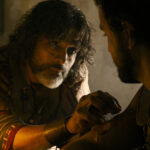Luke Holland’s Final Account is an important documentary about the final surviving participants in the Nazi regime. The film is based on over 300 interviews—compiled over 10 years starting in 2008—with German and Austrian men and women who had varying degrees of involvement in the machinery of Hitler’s Third Reich.
Holland—who died last summer shortly after finishing post-production on the film—devoted the final decade of his life to this project, after he discovered his own grandparents were murdered in a concentration camp. His central questions in the film are simple. For those who were alive in Hitler’s Germany and not actively opposing the regime, what level of culpability do they bear if they’re alive today? What degree of ownership—or repentance—do they express for the atrocities that occurred?
These aren’t new questions. But they are evergreen questions for humans who, everywhere and at all times, tend to blame-shift and name others’ sin more readily than owning their own.
Bearing Witness
The importance of a film like this is, on one level, for the historical record. It’s vital to capture first-person accounts of the Holocaust while primary witnesses still exist. As one interviewee says in the film, “What is not in the archives does not exist.”
This is vital for many reasons, but perhaps mostly because our nature leads us to forget or distort history that is ugly or difficult to believe. As I wrote about a few years ago in a review of the White Lies podcast, “The past is never just the past, even if we wish we could absolve ourselves of it and move on. We are products of the past, inextricably bound up with it.”
Final Account comes at a time when anti-Semitism is on the rise in Europe and in the United States. Meanwhile, accurate knowledge about the Holocaust is disturbingly low among Millennials and Gen Z Americans. In a recent survey of Americans under 40, two-thirds of respondents did not know that 6 million Jews were murdered in the Holocaust, and 1 in 10 said they didn’t recall ever having heard the word “Holocaust.” Almost half couldn’t name one of the more than 40,000 concentration camps or ghettos established during World War II.
For these reasons, the documentary function of documentaries like Final Account is vital. Simply putting real witnesses on screen, describing real things that happened, is crucial in the face of intentional ignorance or forgetting. I hope this film is shown in high schools across America.
One of the most powerful scenes takes place when a former Waffen-SS officer named Hans sits with a group of German students at the site of the Wansee Conference, where Nazi leaders infamously met in 1942 to plan the Final Solution. Some of the students lament the “shame” they carry just by being German; one uses the “protect the Fatherland” language of German nationalism. Hans will not hear it. The former Nazi gets emotional and angry, and shouts back at the student: “Do not let yourselves be blinded!”
It’s a message every audience member should hear, too.
Bearing Culpability
Hans is one of the most repentant former Nazis featured in the film. He calls the SS a “murderous” regime and makes no excuses for his participation in it. He fully owns his culpability. Others in the film respond differently.
One woman who worked as a Nazi bookkeeper uses the “paper-pusher in a huge bureaucracy” excuse to distance herself from culpability. She laments the atrocities of the Holocaust but says, “As a bookkeeper, I had nothing to do with it.” Various others use versions of this excuse—one made famous by Hannah Arendt in her book about the Adolf Eichmann trial, Eichmann in Jerusalem.
Others respond with flat-out denial. One man—when pressed—is unwilling to admit the Nazi party was a criminal organization. These “no regrets” former Nazis are disturbing, to be sure. But the tepid, half-hearted responses of others are moreso. Many in the film recall “whispers” and “quiet talking” about the horrors happening in concentration camps, but they say they were too afraid to speak up; they didn’t want to end up in the furnaces themselves.
This evil is more mundane, but no less chilling. The film opens with a passage from Primo Levi that captures this well: “Monsters exist, but they are too few in number to be truly dangerous. More dangerous are the common men, the functionaries ready to believe and to act without asking questions.”
Ugliness of Excuses. Beauty of Repentance.
As I watched the various responses in Final Account, I kept thinking this: Repentance is beautiful to watch. But the opposite—making excuses for sin, refusing to admit any wrongdoing—is one of the ugliest.
Every human will ultimately give a final account to God (Rom. 14:12), and his justice matters most. But “God will be the one to judge” shouldn’t be an excuse to evade naming and repenting of sin while we can. The “I was just a bookkeeper” woman tries to do this when pressed, but Holland doesn’t let her off the hook. “God is not sitting across the table from me now,” he says. “I want to know what you believe.”
The true “final account” will be at the Great White Throne (Rev. 20:11-13), and so this film’s title is really a misnomer. This is a documentary that calls us to admit, account for, and repent of sin now—publicly, while we’re still living. It’s not a Christian film, but it reminded me of the gospel’s hope, for those who repent: “If we confess our sins, he is faithful and just to forgive us our sins and to cleanse us from all unrighteousness” (1 John 1:9).
If we sin—whether by what we do or don’t do—the stain doesn’t have to mark us for life, as it does for many former Waffen-SS officers in the film who still bear a Nazi-blood group tattoo. But the marks of guilt are only removed if we repent for our sins, rather than evade responsibility for them. The latter is damnation, but the former is hope: not only salvation for you, but beauty and joy for observers on earth, and in heaven (Luke 15:7).
Involved in Women’s Ministry? Add This to Your Discipleship Tool Kit.
 We need one another. Yet we don’t always know how to develop deep relationships to help us grow in the Christian life. Younger believers benefit from the guidance and wisdom of more mature saints as their faith deepens. But too often, potential mentors lack clarity and training on how to engage in discipling those they can influence.
We need one another. Yet we don’t always know how to develop deep relationships to help us grow in the Christian life. Younger believers benefit from the guidance and wisdom of more mature saints as their faith deepens. But too often, potential mentors lack clarity and training on how to engage in discipling those they can influence.
Whether you’re longing to find a spiritual mentor or hoping to serve as a guide for someone else, we have a FREE resource to encourage and equip you. In Growing Together: Taking Mentoring Beyond Small Talk and Prayer Requests, Melissa Kruger, TGC’s vice president of discipleship programming, offers encouraging lessons to guide conversations that promote spiritual growth in both the mentee and mentor.

































